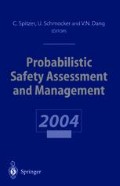Abstract
The purpose of risk management is to identify what can go wrong, how likely it is for these to occur, and what are the consequences if they were to occur. The International Space Station (ISS) Program office uses a continuous risk management process in identifying, analyzing, planning, tracking, controlling and communicating risks. This strategy manages risk by (i) embedding risk management processes into normal day-to-day activities to identify and help manage any risks or potential threats, (ii) facilitating risk-management processes and analyses by providing analytical support and tools.
One of the key quantitative risk analysis methods employed by the ISS program is the Probabilistic Risk Assessment (PRA) modeling techniques. PRA is a comprehensive, structured and logical analysis method for identifying and assessing risks in complex technological systems for the purpose of cost-effectively improving their safety and performance. The International Space Station has been modeled using this PRA methodology and is now used extensively by program management to make strategic decisions. The PRA results can be used as a powerful decision-making tool in support of design, operations, and prioritizing upgrade or reconfiguration decisions. The process helps identify potential new risks, analyze existing risks and subsequently can weigh different options available to the Program to mitigate those risks. The ISS PRA captures possible accident scenarios that lead to several undesired consequences called End States. Some background into the PRA methodology including examples of trade studies recently conducted for the ISS Program will be highlighted in this paper.
Access this chapter
Tax calculation will be finalised at checkout
Purchases are for personal use only
Preview
Unable to display preview. Download preview PDF.
References
E.E. Lewis, Introduction to Reliability Engineering, New York, John Wiley & Sons, 1987
“NASA Policy for Safety and Mission Success,” NASA Policy Directive 8700.1, NASA, Washington, DC.
“Probabilistic Risk Assessment Procedures Guide for NASA Managers and Practitioners,” 2002 Office of Safety and Mission Assurance, NASA, Washington, DC.
“Probabilistic Risk Assessment of the International Space Station Phase II — Stage 7A Configuration,” ISSPRA-00-40, 2002, International Space Station Program Office, NASA, Houston.
Author information
Authors and Affiliations
Editor information
Editors and Affiliations
Rights and permissions
Copyright information
© 2004 Springer-Verlag London
About this paper
Cite this paper
Perera, J., Smith, C. (2004). Strategic Decision-Making Utilizing Probabilistic Risk Assessments for the International Space Station Program. In: Spitzer, C., Schmocker, U., Dang, V.N. (eds) Probabilistic Safety Assessment and Management. Springer, London. https://doi.org/10.1007/978-0-85729-410-4_191
Download citation
DOI: https://doi.org/10.1007/978-0-85729-410-4_191
Publisher Name: Springer, London
Print ISBN: 978-1-4471-1057-6
Online ISBN: 978-0-85729-410-4
eBook Packages: Springer Book Archive

